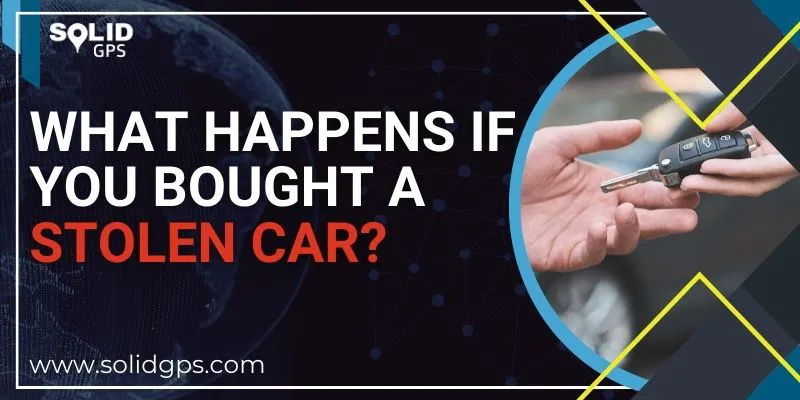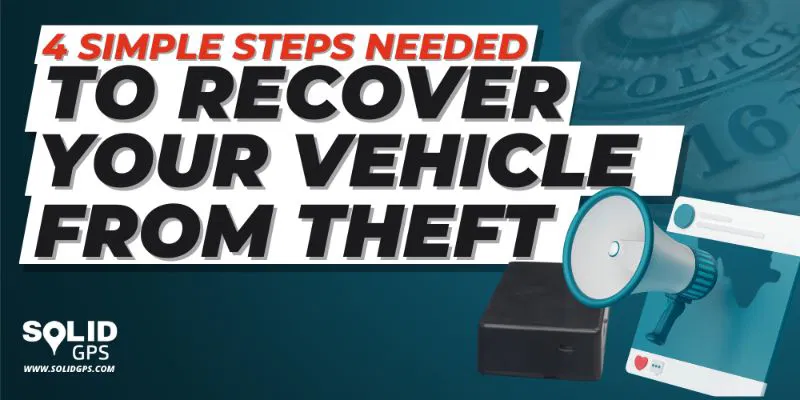Discovering that you’ve unknowingly purchased a stolen vehicle can be a devastating and distressing experience.
While such cases may seem rare, they are often the result of sophisticated scams and deceptive practices by fraudulent sellers.
Taking preventative measures—like securing your vehicle and staying informed about its history—is crucial for reducing risks and ensuring peace of mind.
This guide walks you through essential actions and strategies to help you navigate such a scenario with confidence and clarity.
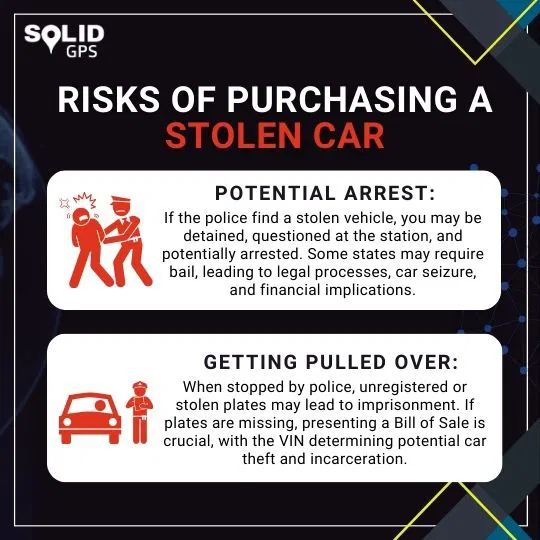
Confirm Your Vehicle’s Status
The first and most critical step upon suspecting that you may have purchased a stolen car is to verify its status using reliable databases.
In Australia, official systems like PPSR (Personal Property Securities Register) and REVS (Register of Encumbered Vehicles) are essential tools for this purpose.
In America, check the car’s VIN using NICB’s VINCheck (National Insurance Crime Bureau) or Carfax. Report it to local law enforcement if flagged as stolen, and visit the DMV (Department of Motor Vehicles) to confirm the title’s legitimacy.
In New Zealand, services like MotorWeb or CarJam are used to check the VIN. If the car is stolen, notify the police and contact Waka Kotahi for registration confirmation.
These systems use the Vehicle Identification Number (VIN) to reveal a car’s history, including any records of theft, accidents, or encumbrances.
Why VIN Checks Are Crucial
The VIN is a unique identifier for every vehicle, and performing a VIN check is the most reliable way to confirm its legitimacy.
Through these databases, you can uncover:
- Whether the car has been reported as stolen.
- Past accident history that may have been hidden by the seller.
- Liens or outstanding debts tied to the vehicle.
Without a proper VIN check, you risk purchasing a vehicle with a hidden and potentially criminal past.
Stolen Cars and DMV Detection
Many stolen vehicles are flagged when buyers attempt to register them.
During the registration process, the VIN and title are checked against national and local databases.
If the VIN is altered, missing, or flagged, officials may seize the vehicle immediately and notify law enforcement.
To avoid this, ensure the title matches the VIN and that the seller provides proper documentation during the purchase.
If you encounter irregularities during registration, cooperate with authorities and provide any supporting documentation you have.
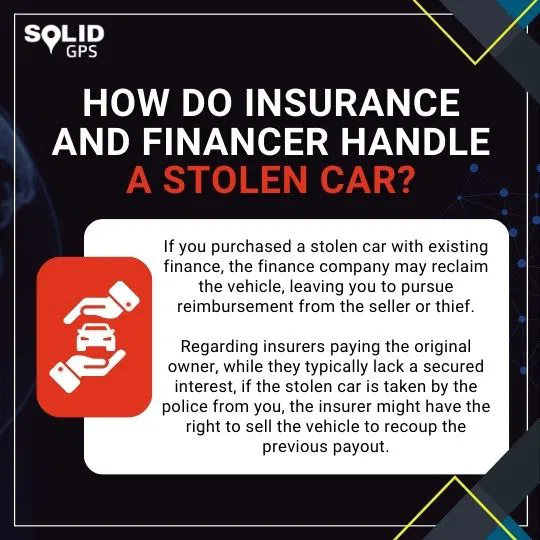
Immediate Consequences of Owning a Stolen Car
If a vehicle you purchased is identified as stolen, several immediate consequences can follow:
- Vehicle Impoundment: The car will be seized and returned to its rightful owner.
- Legal Risks: Even if you purchased the car unknowingly, you may face charges for possession of stolen property, which can lead to fines or even imprisonment.
- Financial Loss: Buyers are typically unable to recover the money spent on a stolen vehicle, as it legally belongs to its original owner.
What to Do Next:
- Notify law enforcement promptly to demonstrate good faith.
- Retain legal counsel to navigate potential charges.
- Preserve all purchase documents as evidence of your intent and transaction history.
Spotting Fake Titles and Documents
One common tactic used by criminals is forging titles, receipts, or identification documents to create the illusion of legitimacy.
As a buyer, it’s critical to scrutinise all paperwork.
Signs of Forgery in Titles:
- Mismatched VINs between the title and the car.
- Obvious alterations, such as inconsistent fonts or erasure marks.
- Missing watermarks or seals typical of official documents.
Always verify the title’s authenticity with your local registration authority before finalising a purchase.
The Importance of a Bill of Sale and Seller’s ID
A bill of sale and valid seller identification are crucial to establishing your good faith as a buyer.
These documents provide:
- Evidence of the transaction.
- Details about the seller, which can assist law enforcement if issues arise.
Before purchasing, request the seller’s ID and ensure it matches the name on the vehicle title.
Refuse to proceed with the transaction if the seller is unwilling to provide proper identification or a bill of sale.
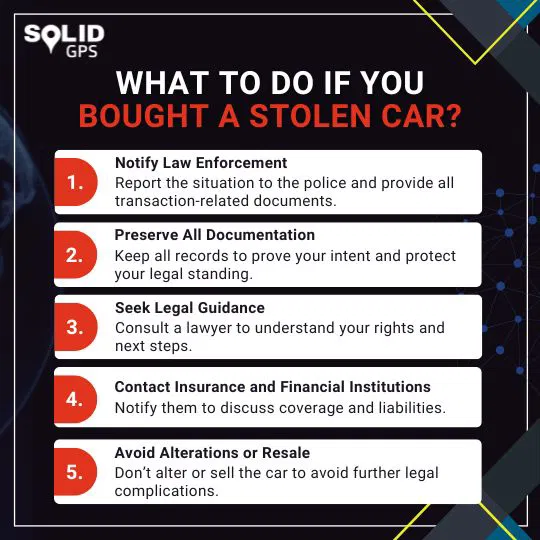
Beware of the Rental Car Theft Scheme
Another scheme involves thieves exploiting rental cars. In this tactic, a vehicle is rented, not returned, and then quickly sold before the rental company has a chance to report it as stolen.
Buyers of these cars often find themselves in legal trouble once the theft is officially reported, usually within 30 days.
To avoid falling victim to this scheme:
- Verify the car’s history using the VIN.
- Be wary of vehicles offered at suspiciously low prices or from sellers pushing for quick transactions.
Behavioural Red Flags to Watch For
Criminals selling stolen cars often display certain behaviours to avoid detection.
As a buyer, you should be alert to these warning signs:
- Rushing the Sale: Scammers may pressure you to complete the transaction quickly.
- Evasive Responses: Refusing to answer questions about the car’s history or avoiding providing personal information.
- Reluctance to Show Documentation: Hesitation or excuses when asked for the title, VIN, or seller ID.
If you encounter any of these red flags, walk away from the transaction immediately.
Steps to Take If You’ve Bought a Stolen Car
If you find yourself in the unfortunate position of owning a stolen car, take these steps:
- Notify Law Enforcement: Contact your local police department and report the situation. Provide all documentation related to the transaction, including the bill of sale, communication with the seller, and proof of payment.
- Preserve All Documentation: Retain all transaction records to demonstrate your intent and protect yourself legally.
- Seek Legal Guidance: Consult with a legal expert to understand your rights and navigate the complexities of the situation.
- Contact Insurance and Financial Institutions: Inform your insurer and any financial institution involved in the purchase. They can advise you on coverage options and potential liability.
- Avoid Alterations or Resale: Do not attempt to modify or sell the vehicle, as this could complicate legal proceedings.
Practising Caution in Vehicle Purchases
To avoid purchasing a stolen car, follow these preventative measures:
- Conduct Thorough Research: Use tools like PPSR and REVS to perform a VIN check and examine the vehicle’s history.
- Verify Seller Credibility: Ask for the seller’s ID and confirm their information matches the title and bill of sale.
- Inspect the Title: Look for inconsistencies, alterations, or signs of forgery.
These proactive steps can save you from significant legal and financial complications.
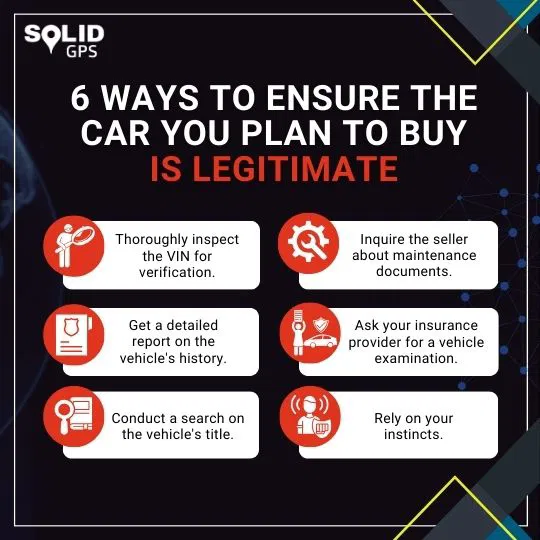
Conclusion
Owning or driving a stolen vehicle—even unknowingly—can lead to severe legal and financial consequences, including impoundment, legal charges, and financial loss.
By conducting thorough checks, verifying seller information, and staying alert to warning signs, you can minimise the risk of purchasing a stolen car.
Taking these precautions not only protects you but also contributes to a more ethical and secure automotive marketplace.

